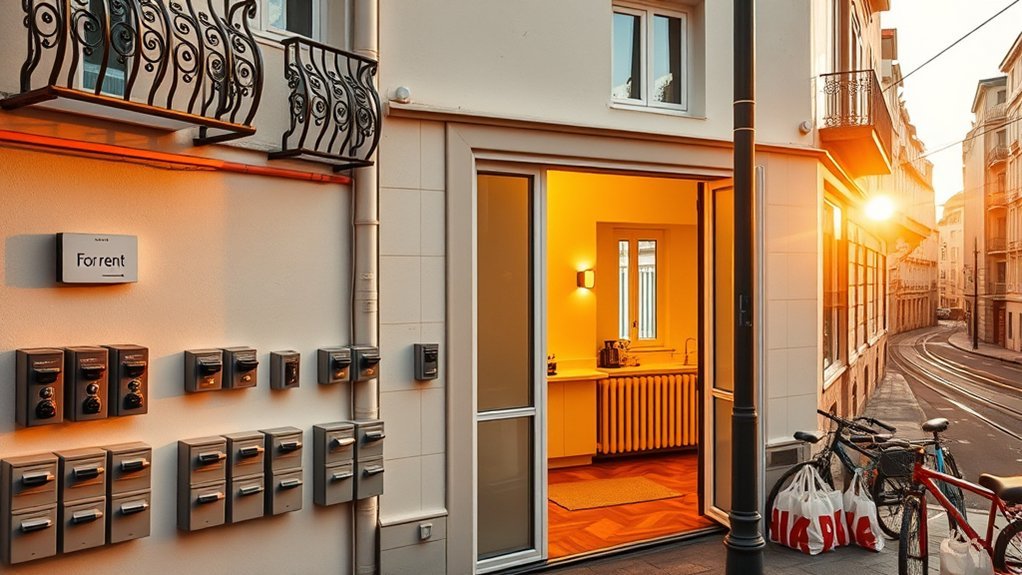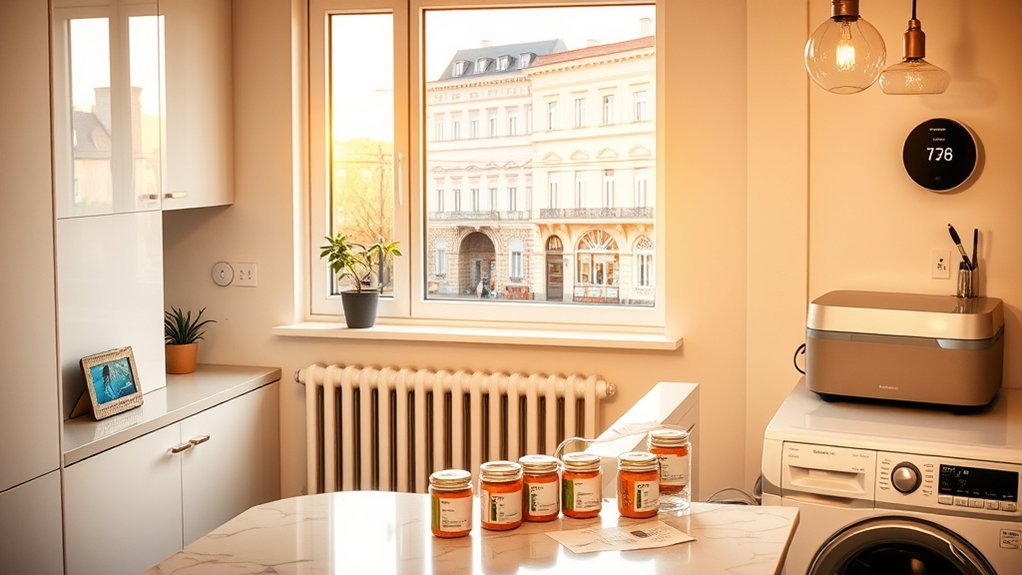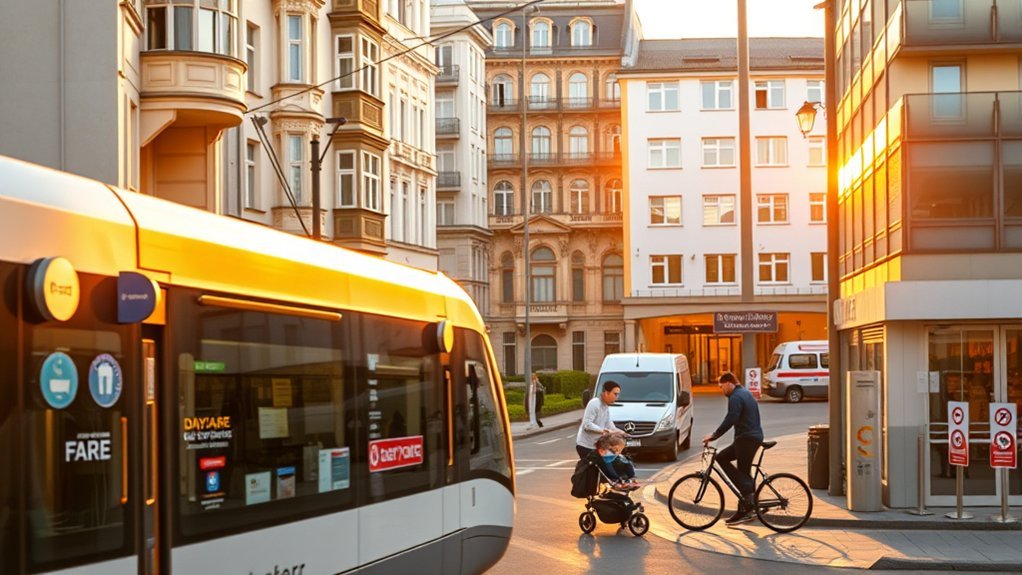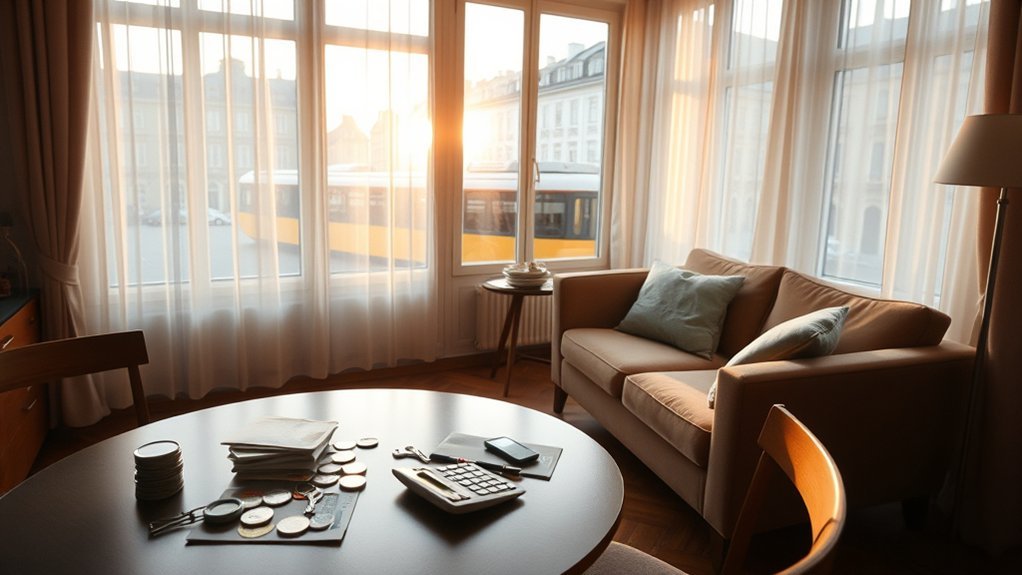You’ll typically need about €2,000–€2,100/month to live in Vienna with rent — roughly €1,000 for a one-bed in the centre or €740 outside — or about €900/month excluding rent for essentials. Utilities and internet add roughly €270–€315 and €30–€35 respectively, groceries €200–€350, and transport €44–€51/month. Expect deposits, possible broker fees and taxes to affect upfront and net pay, and more practical saving tips and category breakdowns follow.
Is Vienna Expensive? An Overview of Living Costs

While Vienna isn’t the cheapest European city, it’s also not among the most expensive: a single person’s monthly cost including rent averages about €2,061 (around €900 without rent), driven largely by housing where a one-bed in the city centre is roughly €1,010/month (about €740 outside centre) and rents run nearly 49% lower than in Seattle; public transport costs are modest (≈€44–€51/month), utilities for an 85–90 m² flat sit around €270–€315/month, groceries are moderate (milk €1.20–1.50/L, bread €2–2.60, eggs €3.50–4.20/dozen), and typical monthly food bills for one person fall in the €200–€350 range. Additionally, connecting with local builders can provide insights into potential housing costs in various locations.
Rent and Housing: Prices, Types, and How to Find an Apartment

Housing will usually be the biggest factor shaping your monthly budget in Vienna, so it helps to know typical rents, fees, and where to look before you start searching.
Expect Vienna rent for a 1-bedroom apartment in the city centre to average about €1,010/month (roughly €800–€1,300) and about €740/month outside (≈€600–€900).
Expect central Vienna 1-bedroom rents around €1,010/month (≈€800–€1,300); outside about €740/month (≈€600–€900).
A 3-bedroom apartment averages ≈€2,050/month in centre (€1,400–€3,500) and ≈€1,350/month outside (€1,000–€1,800).
Prepare upfront for a security deposit equal to three months’ rent and possibly a broker commission of two–three months if you use an agent.
Consider social housing (Genossenschaft) or subsidised options: they can be 25–40% cheaper but often need residency, employment, long waits, and sometimes a buy-in.
For listings use property search platforms like Willhaben and ImmobilienScout24; check local Facebook groups for commission-free offers and hire relocation services for furnished or short-term needs. Regular inspections can catch those issues early that may affect your overall budget if not addressed.
Utilities, Internet, and Monthly Household Expenses

For an 85–90 m² apartment expect basic utilities (electricity, heating, water, garbage) around €270–€315/month on average, though reported ranges run roughly €186–€510. Internet is typically €30–€35/month for 60+ Mbps unlimited and mobile plans range €15–€44 depending on data and bundles; public transport passes cost about €44–€51 monthly. You can cut costs noticeably with better insulation, efficient appliances, lower thermostat settings and by comparing suppliers on sites like Durchblicker. Regular maintenance can prolong system lifespan and help avoid unexpected expenses in other areas of your household budget.
Basic Utilities Costs
You’ll typically pay about €270–€315 a month for basic utilities (electricity, heating, water, garbage) in an 85–90 m² apartment, though reported ranges span roughly €186–€510 depending on building efficiency and usage.
For monthly utilities expect variation: well-insulated units can be as low as €118/month, inefficient ones up to €454.
Utility bills cover electricity heating water and garbage; municipal supplements or a separate TV license (around €15/month per household, regardless of whether you own a TV) may be added.
Internet cost and mobile plan figures are reviewed elsewhere, but note they’re additional to utility bills.
To lower costs, use energy-saving measures: improve insulation, choose energy-efficient appliances, lower thermostat settings, and compare providers via price-comparison sites like Durchblicker.
Internet and Mobile
When you set up internet and mobile service in Vienna, expect to pay about €30–€35/month for an unlimited home connection (60 Mbps+), while mobile plans with 10+ GB of data typically cost roughly €14–€44/month depending on provider and extras.
You’ll see Unlimited home internet prices around €25–€50 in listings, with a Numbeo average near €32.
Mobile phone plans offering 10+ GB of data vary: basic bundles near €14–€20, richer bundles up to €44 monthly fee.
Many landlords list rent excluding Utilities (electricity heating water), so confirm if costs are inklusive.
Use Price-comparison sites like Durchblicker to compare offers and lower your monthly outgoings.
Relative to monthly net salary, these comms costs are moderate and predictable.
Energy-Saving Tips
Now that you’ve got internet and mobile sorted, look at how small changes across utilities and household habits can cut a noticeable share from monthly costs that often sit between €200–€450. In Vienna, focus on heating and insulation: double glazing and draught-proofing drop heating from high levels to about €118/month in well-insulated homes. Use a programmable thermostat, set timers, and lower room temps in winter. Replace old white goods with energy-efficient appliances, fit LED lighting, and kill standby power. Wash at 30–40°C and shorten showers to lower hot-water bills. Compare providers and tariffs on Austrian comparison sites (e.g., Durchblicker) to trim electricity and internet costs.
| Measure | Typical saving | Action |
|---|---|---|
| Insulation | High | Double glazing, draught proof |
| Appliances | Medium | Energy-efficient models |
| Behavior | Low–Medium | Thermostat, shorter showers |
Food and Dining: Groceries, Markets, and Restaurant Prices

One of the biggest everyday expenses in Vienna is food, and you can control costs by choosing where and what you buy. For living cost planning, basic groceries are affordable: a loaf of bread ~€2–€2.60, milk €1.20–€1.50, rice €2.30–€2.50/kg, and eggs €3.50–€4.20/dozen. Chicken fillets run about €10–€13/kg; beef varies €9–€24/kg.
Monthly grocery estimates help budgeting: €300–€350 for a single, €600–€700 for a couple, and €800–€1,000 for a family of four.
You’ll save by using discount supermarkets (Hofer/Aldi, Lidl, Penny) or shopping outer-city markets like Viktor-Adler rather than touristy stalls. Naschmarkt is great for variety but often pricier.
Dining out at a mid-range restaurant typically costs €15–€25 per person, or around €70 for a three-course meal for two in many places. Combine market shopping, occasional mid-range meals, and home cooking to keep food spending predictable and within your budget.
Transportation, Childcare, Healthcare, and Education Costs

Food and grocery choices affect how much you spend getting around, caring for kids, and accessing services, so plan those budgets together.
In Vienna the cost of living for transport and services is predictable: a monthly public transport pass is about €44–€51 (annual ~€365), one-way tickets ~€2.40, with U-Bahn, trams and buses covering most commutes.
Childcare and education vary by choice and quality:
- Childcare: state kindergarten is heavily subsidized or free for older kids; private full-day kindergarten €200–€500/month.
- In-home care: Tagesmutter €300–€600/month, nannies €1,000–€2,000, au pairs from ~€550/month plus room and board.
- Healthcare: public health insurance contributions are a percentage of your gross salary (often well over €50/month for full-time workers) deducted from wages; private expat plans €150–€450/month depending on coverage.
- Schools: international school tuition commonly €14,000–€28,000+ per year (some primary fees €13,500–€22,000).
It’s also important to consider initial startup costs if you’re thinking about opening a group home in the area.
Factor rent and utilities into total household spending when comparing these options.
Salaries, Taxes, Purchasing Power, and Budgeting Tips

When you compare net vs gross pay in Vienna, remember average net salaries typically fall between about €2,600–€3,000 (city averages reported €2,100–€2,975 depending on source), while gross annual figures often range €31k–€45k before taxes and social contributions.
Austria’s progressive tax system (with top marginal rates up to 55%) plus social charges and preferentially taxed 13th/14th salaries can materially change monthly take-home pay, so check your pay slip for deductions.
For practical budgeting, plan roughly €900/month for essentials (excluding rent), then add rent and variable costs like energy, childcare and insurance to see if your net income covers them. Understanding average legal fees can also help in making informed financial decisions regarding potential legal expenses in your budget.
Net Vs Gross Pay
Although gross salaries in Vienna can look attractive — often quoted between about €31,400 and €45,000 per year — your take-home pay will be noticeably lower after mandatory pension, health and unemployment contributions and a progressive income tax (with top rates up to 55% for very high incomes). You should compare gross salary to realistic net salary and use a net-pay calculator to estimate take-home pay, remembering 13th/14th salary boosts annual nets when averaged monthly.
Practical tips:
- Check estimated monthly net vs advertised gross and factor taxes and social security.
- Compare net to monthly living costs (€900 excl. rent) plus utilities cost (~€271–€315).
- Assess rent affordability: 1-bed outside ≈ €740, centre ≈ €1,010.
- Include employer benefits and varied purchasing power when budgeting.
Taxes and Deductions
Having compared advertised gross pay to realistic net figures, you should now look closely at how Austria’s taxes and statutory contributions shape your disposable income.
Your average monthly net salary in Vienna (roughly €2,675–€2,969) depends on progressive income tax and mandatory social contributions (pension, health, unemployment), which cut take-home pay relative to gross.
Many employers pay 13th and 14th payments taxed preferentially; include those when you annualise pay and calculate monthly disposable income.
Use tax allowances and childcare subsidies to increase net resources.
For practical budgeting guidance, subtract typical non-rent costs (~€900) and planned rent to test affordability.
To boost disposable income, lower housing share, compare energy/telecom offers, and claim all allowable deductions.
Budgeting for Essentials
Because your take-home pay depends on progressive taxes, social contributions and those preferential 13th/14th payments, you should start budgeting from an annualised net income and break it down to monthly figures — typically €2,600–€3,000 for many in Vienna but often under €2,000 for low-skilled roles and above €3,000 for skilled professionals.
Use those monthly figures to map rent, utilities and other essentials. Rent dominates: average rent for a 1-bed is ~€1,000 in the city centre and ~€740 outside the city centre. Typical monthly cost excluding rent is ~€900 for a single person.
Practical tips:
- Prioritise annual net → monthly breakdown.
- Hunt outside the city centre to lower average rent.
- Shop discount supermarkets and compare utilities (Durchblicker).
- Factor employer subsidies, child benefits and 13th/14th into monthly expenses.
Frequently Asked Questions
How Much Are Utilities in Vienna?
You’ll pay roughly €270–€320 monthly for utilities (energy bills, heating costs, water supply, garbage collection); add ~€30 internet packages, €15–€44 mobile plans, plus electricity tariffs, gas meters and occasional utility deposits.
What Is the Average Cost of Living in Vienna?
You’ll pay roughly €1,800–€2,060 monthly (€900–€1,280 without rent). Expect affordable public transport, grocery shopping, dining out, nightlife scene; good healthcare access, language classes, cultural events, student discounts and cheap weekend trips.
Is 1000 Euros Enough for a Month in Vienna?
No — €1,000’s tight; you’ll need shared housing or student budget tricks. Cut nightlife costs, weekly groceries, public transport, phone plans and entertainment expenses, trim seasonal spending, and keep an emergency fund to survive month-to-month.
What Salary Do You Need to Live Comfortably in Vienna?
You’ll need about €2,200–€2,600 net monthly for comfortable single living; adjust for family size. Factor housing preferences, commuting costs, lifestyle expectations, tax brackets, health insurance, leisure budget, savings goals and you’ll plan realistically.
Conclusion
Vienna can feel both affordable and costly: rent and utilities bite a chunk of your salary, yet public transport and groceries ease daily spending. You’ll pay more for central apartments but save time; choose outer districts for lower rent and longer commutes. Salaries and benefits often offset taxes, but budgeting still matters—track fixed costs, curb discretionary splurges, and use markets and occasional dining out to balance quality of life with financial security in the city.


